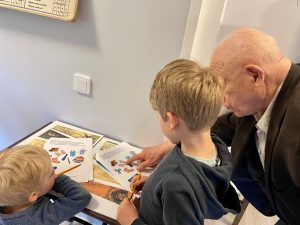Nuorten päihteiden ja nikotiinin käyttö on muuttunut merkittävästi. Perinteinen tupakointi ja nuorten alkoholinkäyttö ovat vähentyneet, mutta samanaikaisesti markkinoille on tullut…
Tekijät | Authors

ESC – European Sales Competition
What is European sales competition?
Sales students from all a round of Europe and Asia, sweet smiles, and new connections. One sales case and everyone are talking about it. You can feel the excitement in air. This is European sales competition. This year the competition is held in Nijmegen, Netherlands, 18-20 of May by HAN University of Applied Sciences after two years of online competitions. In the competition, competitors are put in groups in different rooms, and everyone are giving their sales pits on their own time. The room has judges and a buyer. Every group’s best competitor goes to the next round until they hit the final round, and someone wins the competition. But right now, we are focusing on last year’s buyers and their thoughts.
We decided to do our research by interviews. We connected 7 past buyers from ESC from different starting points and interviewed them via Teams. We made a battery of questions, with that and spontaneous questions we got the right answers for the article.
With the gathered information we were able to do our research of how acting as buyer in international sales competitions improve internationalization competences and write an article of it.
A mutual opinion was that sales competition is a good experience not only for the competing students but also for the buyers and judges
Although many people from different backgrounds and age groups were interviewed there seemed to be a mutual opinion that sales competition is a good experience not only for the competing students but also for the buyers and judges. The cases have been created to resemble real-life situations and thus the participants can adopt something to their future endeavors in real situations. From a buyer’s point of view one could learn about the sales process and what to expect from the seller and also to how to be a buyer, ask questions and possibly object if something doesn’t meet one’s expectations. Although general feedback seemed to be that the buyers felt they handled their task of being a buyer well, there were some problems.
How acting as buyer in international sales competitions improve internationalization competences?
That people faced. For some it felt a bit strange to step into other people’s shoes and pretend to be a representative of a company and product one knows nothing about. Of course the seller has a responsibility to keep the buyer on track, the buyer should still have a basic knowledge about the situation. However the common opinion seemed to be that the preparation material was enough.
One other problem that some of the buyers faced was finding the midway of being passive enough, meaning that they shouldn’t lead the sellers too much and help them with their task. It’s difficult to stay completely objective and similar to every contestant, so that everyone gets the same chance. This logical opinion seemed to be the opinion of every buyer.
It is an international sales event involving competitors as well as judges from all over Europe. When there are participants from many different countries, different cultures can also be seen. Cultural knowledge in the sales situation is absolutely essential and the buyer gains personal experience by participating in the competition as a buyer. Internationalization is also one of the biggest trends today and international competitions like this will help you grow your network and build relationships across the Europe. The competition also provides an excellent experience of acting as a buyer. For many, the job is totally new and this is a great way to gain experience from it as well.
Any culture differences?
One of our interviewed buyers was experienced especially in Asia. He had learned few big differences in sales and buying from our Scandinavian style. Asians tend to be really polite, and all the polite manners really matter to them. Hierarchy is also significant in Asia, usually.
In Central-Europe salespersons tend to be very strict in structure and their presentations are well prepared and contain lots of data. This needs different approach from the buyer.
Silence is not as accepted in Asia for example than here in Finland
For us Finns is important to remember that silence is not as accepted in Asia for example than here in Finland. Straight “no” answer might not be ok in every Asian culture too. The culture in Europe is more similar to Finland but good buyer needs to know for example effects of religion.
How important the first impression is?
When we interviewed the buyers, all of them brought up the importance of first impression. Salespersons need to look good, clean and formal. You don’t necessarily have to wear suit, but smart casual look is good to have at least. How do you look is the first thing that the customer sees, and you can affect it pretty easily, so make sure you look good? Try to make your voice loud enough and clear so you are easily understood. Remember the manners, it is important to take the other one into account. “It’s not about you, it’s about the other guy”. All these together forms the first impression and it is generally formed in the first 10 seconds.
First impression: Salespersons need to look good, clean and formal
First impression is essential and psychological part in sales, because you must sell yourself to the customer and build trust before you can make them buy something from you. If you succeed you keep the customer focused and interested about what you are saying. Then again you can lose the interest of the buyer if you don’t give good impression and they will almost immediately make the conclusion that they don’t want to buy from you. The bad thing about the first impression is, that it is really hard to change some one’s opinion about you or the product if you fail at this. So remember be polite, talk clearly, look good and be yourself don’t act anything you are not, they will notice that.
Human knowledge in sales
From the buyer viewpoint the competition improves their human knowledge. The cultures do show in the competition but not too much. It is more about the competitor’s personality and how they show it. More importantly how they use it as an advantage. Many of our interviewed buyers said that it was fun to see different selling types and they have learned a lot about themselves and what works for them. A few even said that they liked some lines so much that they will be using those by themselves. Of course, the buyers’ personalities and views of life are showing too, making the competition even more fun.
How real the sales competition was?
The European sales competition has been held for several years. Every year, the competition has changed for the better and the bugs noticed by the participants and the judges have been corrected. According to several judges, the competition has become realistic, and it is close to real life sales meeting. The only major concern was the start of the sale activity. For example, normally the salesperson would do the first contact to a potential customer by phone.
Group of 5 sales engineer students from Turku University of Applied sciences interviewed 7 last year’s buyers from the competition
European Sales Competition (ESC) is organized annually by European Universities, who have passion for sales. Every year the most promising future sales professionals from Europe and invited countries get together to develop sales competences. The granting rights of ESC are awarded by European Sales Competition Association (ESCA) based on applications. For more information, visit https://www.europeansalescompetition.com/ or contact ESCA chairman Timo Holopainen. In 2023 is organized by Wittenborg University of Applied Science For more information https://www.wittenborg.eu/wittenborg-selected-host-european-sales-competition-2023.htm.









Mielenkiintoista asiaa ja osittain sellaisia kulttuurien välisiä eroja tuli tekstissä ilmi, mitä ajattelinkin olevan olemassa myyntiin liittyen.
Kiitos Severi palautteesta.